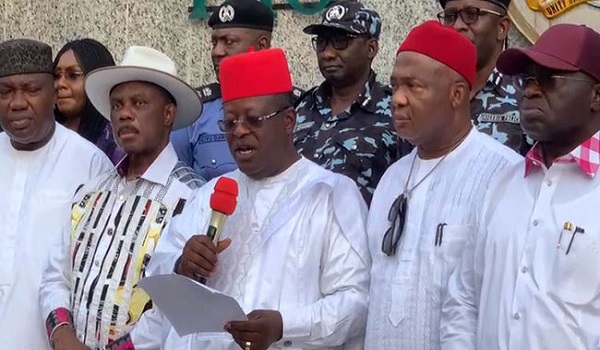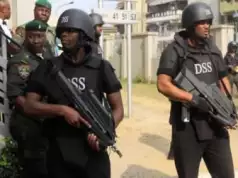South-East governors and leaders on Tuesday announced measures to end the rising violence and sit-at-home (Ghost Mondays) in the zone.
The measures include the launch of the Ebubeagu security outfit by the zone’s five states before December 31 and engagement with the Federal Government for amicable settlement of all issues agitating the minds of the people, especially the youth.
They also resolved to join forces with security agencies to restore peace to the zone and encourage Ohanaeze Ndigbo, traditional rulers, the Southeast wing of the Christian Association of Nigeria (CAN), and clerics to continue ”dialogue with our youths.”
The strategies formed the highlights of an eight-point communique issued by the governors after their meeting in Enugu. It was attended by Ohanaeze Ndigbo, traditional rulers, Southeast National Assembly caucus leaders, and clerics.
The Southeast governors in April 2021 came up with Ebubeagu Security outfit, a concept similar to Amotekun in the Southwest.
It, however, never saw the light of the day in the states, except in Ebonyi, where it presently operates without uniform.
A former General Officer Commanding the 81 Division of the Nigerian Army, Maj. Gen. Obi Umahi, who headed the Southeast Security Committee that midwife Ebubeagu, resigned in June, citing lack of funding and office as reasons.
Also yesterday, Senate Minority Leader, Enyinnaya Abaribe, raised the alarm that there are over 30 separatist groups in the Southeast.
In the communiqué read on their behalf by Governor Dave Umahi of Ebonyi State, the Southeast governors and leaders accused the Igbo in Diaspora of issuing the sit-at-home directives.
They vowed to do everything within the law to ensure that there would be no further sit-at-home in the zone.
The Indigenous People of Biafra (IPOB) introduced the sit-at-home practice to protest the detention of its leader Nnamdi Kanu.
The group announced a month-long sit-at-home from October 21 should security agents fail to produce Kanu in court.
The governors, who also said they were studying the issue of the marginalisation of the Southeast people, added that they would ensure that the November 6 governorship election in Anambra State was not truncated.
The communiqué also reads: “The meeting agreed that the Southeast Ebubeagu security outfit be launched in all the Southeast states and laws passed in various Southeast states before the end of 2021.
“The meeting received the committee report from Ohaneze on various matters affecting the Southeast, especially on the issue of security and marginalisation of the Southeast people, and resolved to study the reports.
“The meeting agreed to support security agencies to restore peace in the Southeast.
“The meeting resolved to support election in Anambra State and directed security agencies to ensure a peaceful election in Anambra State come November 6, 2021.
“The meeting commended all groups and the clergy for their efforts at interfacing with our youths.
“The meeting mandated our clergymen, bishops, CAN, Ohaneze Ndigbo and traditional rulers to continue to dialogue with our youths.”
Anambra State Governor Willie Obiano was absent. His Abia State counterpart Okezie Ikpeazu was represented by his deputy, Udo Okochukwu.
In attendance were former governors Theodore Orji (Abia) and Martins ElechI (Ebonyi); former Deputy Senate President Ike Ekwemadu; Abaribe; Ohanaeze Ndigbo Worldwide President, Prof. George Obiozor and his predecessor, Nnia Nwodo.
Abaribe, in an interview with Channels Television’s yesterday said that people do not know that apart from IPOB, many other separatist groups existed in the Southeast.
He said: “One of the biggest problems the media have is that they tag everything IPOB. In the Southeast, you won’t believe that there are more than 30 different separatist organisations, including IPOB and the Movement for the Actualisation of the Sovereign State of Biafra (MASSOB). There are so many and each one of them comes back to the same thing.
“Why you are having separatist agitations everywhere today in the West, in the Southeast, and in the Southsouth, is that some people are unable to manage our diversity. That is just the fact.”
Abaribe argued that those calling for secession were merely protesting the marginalisation of their people and demanding that their grievances be addressed.
The lawmaker asked the government to dialogue with them to restore calm and peace in various parts of the country.
Abaribe, who added that the government should be concerned that a sit-at-home order by a non-state actor was being complied with, said if he were to become President Muhammadu Buhari’s successor in 2023, most of the problems facing the country would be put to an end within six months
He said: “It should worry the government if a non-state action is complied with in this manner, it takes us back to what I said at the beginning that there is a need to sit and talk with these people.
“There is nobody from the Southeast that I know, who does not feel that the way the people from the Southeast are treated today, that there is something fundamentally wrong which should be resolved.”
Asked if he would accept the offer to be the presidential candidate of the Peoples Democratic Party (PDP) in 2023 and what Nigerians should expect if elected, Abaribe, replied: ”I would if it falls on me, within six months end all these things (Nigeria’s problems). These things will be a thing of the past.”










